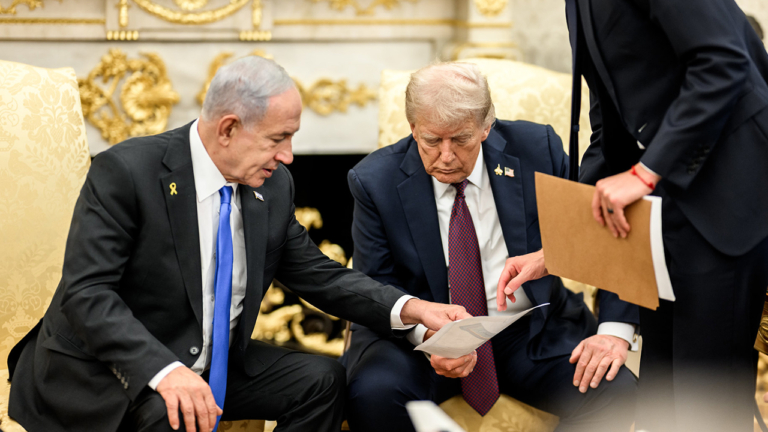Starmer’s Foreign Policy: Continuity or Change in Britain’s Global Posture?
As prime minister Keir Starmer charts the course of the UK’s foreign policy, how will it shape Britain’s global position?
With Keir Starmer taking office at Downing Street following Labour’s landslide victory last year, attention quickly shifted to Britain’s position on the global stage. Starmer inherited a world characterised by geopolitical realignment, with the post-Brexit order remaining unstable. Great power rivalry is intensifying, and the rules-based international system is under strain. While Labour leaders have often highlighted the importance of ethical diplomacy and multilateralism, the limitations of statecraft and the legacy of the Conservative era pose a crucial question: will Starmer’s foreign policy deliver a genuine shift, or will it be a continuation of established norms?
Thematic Continuity: Atlanticism and NATO Leadership
One area where continuity is virtually certain is Britain’s commitment to NATO. Starmer has been unequivocal in affirming support for the alliance, especially amid Russia’s war in Ukraine. Defence Secretary John Healey has confirmed the Labour government’s “unshakable commitment to NATO” and that a Labour government would raise “defence spending to 2.5% of GDP” (Healey, 2024).
This reflects a deeper strategic reality, with the UK’s global posture continuing to rest on the twin pillars of NATO and the ‘special relationship’ with the United States. Starmer’s trip to Washington for the NATO summit in 2024 drew praise from Joe Biden, who described the UK as “the best of allies” (Klierderman, 2024). In practice, Labour is unlikely to diverge significantly from the integrated deterrence strategy pursued under both former prime ministers Sunak and Johnson.
Europe Revisited: Realignment Without Rejoining
Whilst Britain’s transatlantic security commitments remain intact, Starmer’s approach to Europe marks a more noticeable recalibration. While Labour has ruled out rejoining the EU, the single market, or the customs union, the party seeks to make Brexit work by rebuilding trust and reducing friction in trade and diplomacy. Policies such as the Security and Defence partnership between the EU and UK illustrate this reset (FCDO, 2025).
This represents a pragmatic shift from the more adversarial tone of previous governments towards strengthening institutional links. The 2025 UK-EU trade deal altered a plethora of trade policies, but arguably most significantly, gave the UK participation in the £125 billion EU defence fund (Parliament Politics Magazine, 2025). This represents Starmer’s ambitions to foster more positive relations with Brussels, Paris and Berlin, marking a shift from the more adversarial approach of his predecessors. However, the scope for deeper alignment remains limited, with EU leaders cautious about offering bespoke deals without wider political commitments, meaning any gains will be incremental. Regardless, Labour’s renewed engagement regarding Europe symbolises a broader effort to reframe Britain as a cooperative, rule-abiding international actor.
Ukraine and the Rules-Based Order
Support for Ukraine remains a cornerstone of British foreign policy across party lines. Starmer has pledged to sustain military, economic, and humanitarian assistance, positioning the UK as a leader in defending the international rules-based order.
Beyond Ukraine, Starmer’s emphasis on human rights and international law recalls elements of Robin Cook’s late-1990s “ethical foreign policy”. Yet, balancing values with interests is challenging in an era where major powers, such as China and Russia, openly contest Western norms. Critics may question whether Labour can apply its values consistently, particularly in relations with Gulf states or, increasingly, with arms exports to conflict zones, pressuring Starmer to balance principle with pragmatism.
China: Strategic Caution Over Confrontation
On China, Labour faces perhaps the most complex foreign policy challenge. The Conservative government took a more hawkish tone in recent years, designating China as an “epoch-defining challenge” (Rathbone, 2023). Starmer, while avoiding inflammatory rhetoric, has called for a “clear-eyed approach” that defends national interests without closing the door to cooperation.
Labour is expected to strengthen protections against Chinese influence in key sectors such as AI, critical minerals, and telecommunications. Yet economic realities demand continued engagement. China is the UK’s third-largest trading partner (Hansard, 2025), and collaboration on climate and global health remains necessary. The UK’s view on China can be used as a microcosm of labour’s foreign policy; aiming to steer clear of binary choices in a world of multipolar interdependence, and as such foreign policy under Starmer will likely focus more on resilience and sovereignty, rather than complete decoupling.
Strategic Stability, Tactical Shifts
Keir Starmer’s foreign policy is likely to blend continuity in grand strategy with tactical shifts in tone, diplomacy, and institutional engagement. NATO, the special relationship, and support for Ukraine will remain unchanged. However, relations with Europe will likely warm, development policy is expected to regain its ethical framing, and a more cautious engagement with authoritarian powers may emerge.
Ultimately, Starmer faces the same constraints as his predecessors: limited defence budgets, economic fragility, and geopolitical uncertainty. But in contrast to the ideological disruption of recent years, Labour’s foreign policy is positioned to be more rules-oriented and multilateral. Rather than radical change or complacency, Starmer’s approach signals incremental change framed as stability. Whether this enhances Britain’s influence or simply realigns it remains uncertain, but what is clear is that under Starmer, Britian seeks to position herself as a steadier hand in an increasingly turbulent world.
Bibliography
- Healey, J. (2024). Speech at RUSI on Defence Priorities. Labour Press Office.
- Labour Party (2024). General Election Manifesto. London: Labour HQ.
- Foreign Affairs Committee (2023). UK Strategic Posture Review. House of Commons.
- House of Commons Library (2023). UK-EU Relations: Trade and Cooperation. House of Commons.
- Brattberg, E. and Le Corre, P. (2023). China and the West: Strategic Decoupling? Washington, DC: Carnegie Endowment for International Peace.
- Ahmed, K. (2023). Britain’s Gulf Strategy: Trade, Power and Ethics. London: Chatham House.
- Foreign, Commonwealth & Development Office (2025). Security and Defence Partnership between the European Union and the United Kingdom of Great Britain and Northern Ireland. GOV.UK, 19 May. Available at: https://www.gov.uk/government/publications/uk-eu-security-and-defence-partnership/security-and-defence-partnership-between-the-european-union-and-the-united-kingdom-of-great-britain-and-northern-ireland
- Rathbone, J.P. (2023). ‘UK Warns China Poses “Epoch-Defining Challenge” to World Order’, Financial Times, 13 March. Available at: https://www.ft.com/content/b3dda418-7da2-4260-958d-4eeae506219a
- Hansard (2025). ‘UK-China Relations’, Hansard, UK Parliament, 8 October. Available at: https://hansard.parliament.uk/commons/2025-03-26/debates/AEAD0A00-3CB5-4FFB-81F4-2C87EC2B48D8/UK-ChinaRelations
- Parliament Politics Magazine (2025). ‘What Is Starmer’s UK-EU Trade Deal 2025? An In-Depth Analysis’, Parliament Politics Magazine, 19 May. Available at: https://parliamentnews.co.uk/what-is-starmers-uk-eu-trade-dea2025-an-in-depth-analysis
- Kleiderman, A. (2024). ‘UK-US Relations “Strong” Says Keir Starmer as He Meets Joe Biden’, BBC News, 11 July. Available at: https://www.bbc.co.uk/news/articles/cn086gyq70jo
- Courea, E. (2024). ‘Labour Tells China It Will Act on Interference in UK Democracy’, The Guardian, 25 March, Politics section. Available at: https://www.theguardian.com/politics/2024/mar/25/labour-tells-china-it-will-act-on-interference-in-uk-democracy



